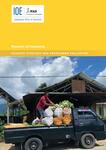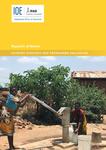Page Header

Downloads:
1
Democratic Republic of the Congo Country Strategy and Programme Evaluation
Overview
This Country Strategy and Programme Evaluation for the Democratic Republic of the Congo covers the period 2003 to 2015 and five projects for which IFAD has committed about US$156 million.Since the first loan in 1980, IFAD has financed eight projects, targeting over half a million households. The estimated total project cost is US$339 million, of which two thirds were financed by IFAD. The country programme's short-term impact on agricultural productivity and food security, household incomes and human and social capital is quite significant as a result of the strategic choice to focus on quick-impact actions in a highly precarious baseline situation. The programme had very good quantitative results in terms of organizing producers, using farmer organizations as the main point of entry for supporting the revival of agriculture. By investing heavily in better access roads, improved seed distribution and agricultural extension, the programme contributed to raising productivity and incomes, and to improving food security in the project areas. The country strategic opportunities programmes and project portfolio are broadly relevant to national and IFAD corporate strategies and the needs of the rural poor, however, the evaluation found that the country context of fragility and accompanying risks are not sufficiently taken into account in the analysis of the operating context, strategies, approaches and partnerships. There is a mismatch between the country programme's ambitious objectives and complex arrangements, short project duration and limited external support on the one hand, and the major contextual challenges and limited management and planning capacities of the project teams, on the other. The evaluation puts forward various critical recommendations for the future partnership between IFAD and the DRC, such as adjusting the institutional set-up of the country programme; strengthening its strategic relevance and targeting approach; and improving relevance and effectiveness of non-lending activities (e.g. policy dialogue, knowledge management and partnership-building).Report Details
| Year Published | |
| Type | |
| Joint | No |
| Partner/s | N/A |
| Agency Focal Point | Michael Carbon |
| Focal Point Email | m.carbon@ifad.org |
| Managed by Independent Evaluation Office | Yes |
| Country/ies |
YOU 'RE READING
Democratic Republic of the Congo Country Strategy and Programme Evaluation








